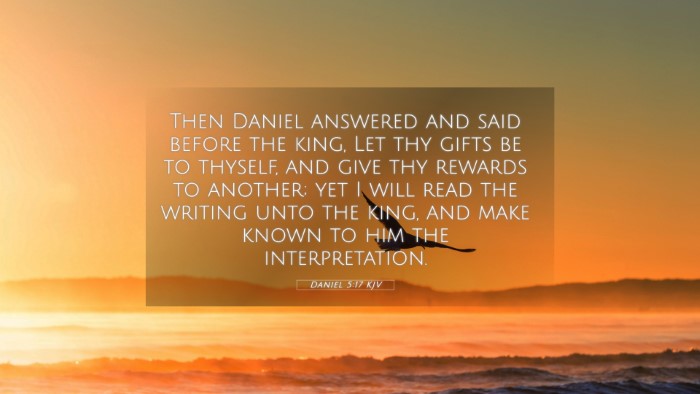Understanding Daniel 5:17
Daniel 5:17 reads: "Then Daniel answered and said before the king, Let thy gifts be to thyself, and give thy rewards to another; yet I will read the writing unto the king, and make known to him the interpretation." This verse occurs within the context of Belshazzar’s feast and the mysterious writing on the wall, and it emphasizes Daniel's integrity and commitment to truth over material gain.
Verse Meaning and Context
Daniel's response to King Belshazzar reveals several key points:
- Integrity and Principle: Daniel refuses the king’s offers of gifts and rewards, demonstrating a strong principle of integrity. As Matthew Henry notes, he did not seek personal gain, which is a powerful lesson on prioritizing truth over wealth.
- Prophetic Role: Daniel's role as a prophet is highlighted here. He is willing to interpret the writing despite the inherent danger, reflecting his commitment to God and His message (Albert Barnes).
- God’s Sovereignty: The verse emphasizes that the interpretation is not for material compensation but as a service to God and the king. Adam Clarke points out that Daniel’s integrity showcases the supremacy of divine authority over earthly power.
Broader Biblical Connections
Examining Daniel 5:17 in light of other scriptures can enrich understanding. Here are several related verses that highlight themes of integrity, prophecy, and honesty:
- Proverbs 15:27: "He that is greedy of gain troubleth his own house; but he that hateth gifts shall live." - This verse reinforces the value of integrity over financial gain.
- 1 Samuel 12:3: "Here I am: witness against me before the LORD, and before his anointed: whose ox have I taken? or whose ass have I taken? or of whom have I defrauded? whom have I oppressed?" - Samuel emphasizes accountability and honesty in leadership.
- Matthew 6:24: "No man can serve two masters: for either he will hate the one, and love the other; or else he will hold to the one, and despise the other..." - Jesus speaks about serving God wholeheartedly without compromise.
- Acts 8:20: "But Peter said unto him, Thy money perish with thee, because thou hast thought that the gift of God may be purchased with money." - Apostolic teaching against the commercialization of spiritual gifts.
- 2 Peter 2:15: "Which have forsaken the right way, and are gone astray, following the way of Balaam the son of Bosor, who loved the wages of unrighteousness." - A cautionary reference to those who compromise integrity for money.
- Jeremiah 6:13: "For from the least of them even unto the greatest of them every one is given to covetousness; and from the prophet even unto the priest every one dealeth falsely." - A warning against corruption in society.
- Proverbs 11:1: "A false balance is abomination to the LORD: but a just weight is his delight." - This verse stresses the importance of fairness and honesty in dealings.
Thematic Bible Verse Connections
This verse resonates with overarching themes in the Bible, such as:
- Faithfulness to God: Throughout scripture, characters like Daniel exemplify faithfulness in the face of adversity.
- Divine Revelation: The act of interpreting dreams and visions connects with several Old Testament prophets, such as Joseph in Genesis.
- Resistance to Temptation: Just as Daniel resisted the temptations of wealth and reward, many figures in the Bible exhibit similar resilience, such as Job and Paul.
Cross-referencing Biblical Texts
Daniel 5:17 can be used as a springboard for deeper study via a Bible concordance or a Bible cross-reference guide that shows similar circumstances and themes across various texts. Below are some methods of cross-referencing:
- Topical Studies: Identifying verses related to integrity, service, and prophecy.
- Inter-Biblical Dialogue: Analyzing how different books of the Bible respond to similar themes, revealing a cohesive narrative.
- Comparative Analyses: Juxtaposing Daniel’s experience with those of prophets such as Ezekiel or Isaiah.
Conclusion
Daniel 5:17 teaches about the importance of integrity and unwavering commitment to God’s truth. Through cross-referencing this verse with others, readers can gain a richer understanding of fidelity in the Bible and the consistent message of prioritizing divine service over worldly gain.
For those wanting to delve deeper, utilizing tools and resources like a Bible cross-reference system can not only enhance study but also provide the necessary framework for comprehensive Bible verse analysis.










